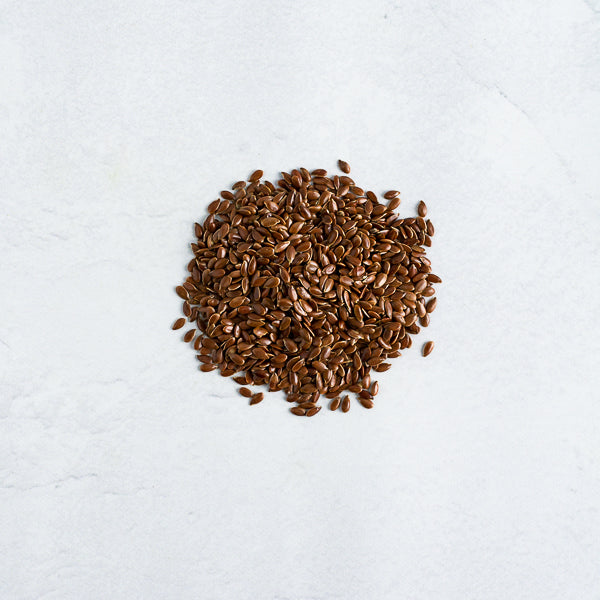We have been trained to look for fat content as the main marker of whether food is or “good” or “bad” for us. But are all fats created equally? You may have noticed that our higher protein products are also high in fats. That’s because we pack in all that protein from whole roasted pumpkin seeds, which contain unsaturated fats. We turned it over to our resident dietitian, Hannah Meier, to break it all down for us and bust some myths about fats.
What Are the Health Benefits of Fats?
One of the biggest myths about fat, made popular in the 80’s and 90’s during the low-fat food craze, is that dietary fat is immediately stored as fat in our bodies. First, it is important to know that having fat on our bodies is essential for insulation, hormone production, and cellular health. Second, our bodies store excess calories - from any food - as body fat to burn for energy later.
Our metabolism (how many calories we burn per day) is a complicated system that balances fuel from food (calories in) with physical activity and bodily functions (calories out). Our bodies naturally tend to keep this balance of calories in check by sending hunger and fullness cues to tell us to eat or not to eat. But fats are not immediately turned into fat in our bodies when we eat them any more than carbs or protein are. Eating fat with a meal can actually make that meal more filling, preventing us from feeling overly hungry and eating more than we need to.
As one of the main energy-providing components of food, fat is essential to include in a balanced diet. Not only does it provide more than twice the energy per gram of protein and carbohydrates, fat also slows down digestion, which keeps hunger in check. Consuming fat is the only way for our body to absorb vitamins A, D, E and K.
- Vitamin A helps our eyes adjust to light changes and also plays a role in bone development, reproduction, and regulating our immune system.
- Vitamin D, which we can absorb from the sun during some times of year (depending on where you live), is also in our food and is essential for helping our bodies absorb calcium.
- Vitamin E is an antioxidant that protects our cells from damage - it is also found in seeds along with the healthy fats needed to absorb it.
- Vitamin K promotes blood, bone, and kidney health.
All of these fat-soluble vitamins are essential for keeping our bodies functioning and strong, but we wouldn’t be able to absorb them without also having fats in our diet.
The original Nutrition Facts Panel emphasized Calories from Fat and Total Fat because, at the time, it was assumed that foods high in fat increased the risk of heart disease. 25 years later, there is more evidence to suggest that we should focus on the type of fat rather than the total amount of fat when determining how nutritious a food is.
The Healthy Fats
Unsaturated fats, like those in seeds, oils, nuts, and fatty fish have consistently been associated with longer lifespan and positive health outcomes such as reduced blood pressure, lower cholesterol, and improved insulin sensitivity, especially when you eat them instead of other types of fat.
88 Acres foods all use seeds which provide a nutritious dose of unsaturated fats in every bite. One handful (about one ounce) of sunflower, pumpkin, flax, or watermelon seeds provides about 10 grams of healthy unsaturated fat. The flax seeds that we use in our Seed Bars are also loaded with omega-3 fats, an essential fat (meaning we must get it from food) that provides a boost of inflammation-fighting benefits.
The Other Fats
Trans Fat
Trans fat is a type of fat that is commercially produced by hydrogenating oil and is used to give products a long shelf-life. Since we now know that consuming trans fat increases our risk for heart disease, food companies are required to list the amount of trans fat in one serving of their products on their labels. Because of this, it has been increasingly phased out of the food supply. You can trust that 88 Acres will never use hydrogenated oils in our products.
Saturated Fats
Saturated fats have long been maligned by public health organizations for their apparent association with increased risk of heart attacks and stroke. But, over time, we’ve learned that not all saturated fat behaves the same way in our bodies.
- Animal Fats & Palm Oil - So far, we know that animal fats as well as palm oil (often found in nut butters and chocolate) seem to raise cholesterol the most. Dairy fats such as whole milk and butter are saturated, but don’t appear to have the same consistent negative effect on disease outcomes.
All 88 Acres products are vegan, which means they do not contain any animal products or products derived from animals, like honey and eggs. This, however, does not mean that 88 Acres products do not contain saturated fats. There are small amounts in all of our seed-based foods.
88 Acres Seed Butter
The Take Home Message
All fats are not inherently bad. Fats are essential for absorbing vitamins A, D, E and K. When evaluating a food, focus on the type of fat, not the calories. Plant-based, unsaturated fats from seeds can help us feel satisfied and full, and may also reduce the risk of developing heart disease, diabetes, and other chronic health conditions.





